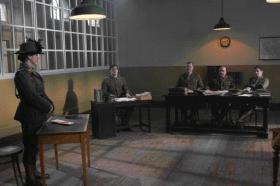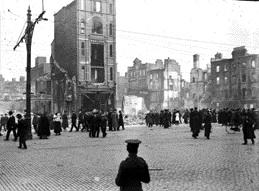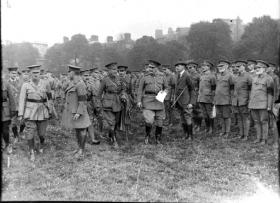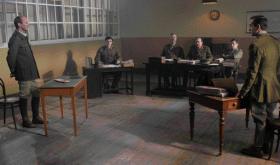TV Eye
Published in 20th-century / Contemporary History, Issue 3 (May/Jun 2006), Reviews, Revolutionary Period 1912-23, Volume 14The man who lost Ireland
RTÉ 1, Tuesday 18 April, 10.15pm
Hidden History
Directed by Darragh Byrne
Produced by Steve Carson
by Eamon O’Flaherty
The public appetite for analyses of theEaster Rising seems insatiable. Later in the year TV Eye will reviewthe media response to the ninetieth anniversary of the Rising, but atthis point, and very much in medias res, it is important to acknowledgethe very high standards of much of the historical work on 1916currently being produced, a quality epitomised by RTÉ’s documentary onGeneral Maxwell, the man given the task of ending the rebellion andpunishing the rebels.  Attention to historical context and an engagementwith many different perspectives are essential parts of historicalanalysis and offer the only escape from the arena of journalisticpolemic. This was abundantly provided by a sophisticated interweavingof eight historians’ perspectives on the official response to therebellion in the critical month following the surrender of theprovisional government on 29 April 1916. The film was given addedweight by the use of the recently released courts-martial transcripts,which had been closed for almost 90 years.
Attention to historical context and an engagementwith many different perspectives are essential parts of historicalanalysis and offer the only escape from the arena of journalisticpolemic. This was abundantly provided by a sophisticated interweavingof eight historians’ perspectives on the official response to therebellion in the critical month following the surrender of theprovisional government on 29 April 1916. The film was given addedweight by the use of the recently released courts-martial transcripts,which had been closed for almost 90 years.
The micro-history of the aftermath of Easter Week is perhaps the onlyway to attempt some sort of historical consensus on the implications ofthe Rising for British policy towards Ireland, and the transformationof Irish nationalist opinion in the twelve months following Pearse’ssurrender. The remarkable degree of consensus among the expertsappeared considerably more than a feat of superb editing. In fact itconfirms one of the most enduring interpretations of the centralimportance of the Rising in modern Irish history: that it provokedprecisely the sort of British reaction intended by the revolutionaries,which in turn produced the transformation of Irish nationalist opinionthat Pearse predicted. By focusing on Maxwell, the film offered avaluable perspective on the almost impossible set of choices faced bythe British in April and May 1916 and explains much about the largercontext of the failure of Britain’s Irish policy at a crucial juncturein the history of both countries.
 As Charles Townshend remarked, Maxwell’s appearance in Ireland and hishandling of the crisis confirmed all the worst Irish nationaliststereotypes about the British government of Ireland. Maxwell was acareer soldier who spent most of his adult life serving theEmpire—notably in Egypt. He appears to have had no politicalqualifications of any kind and was almost completely ignorant ofIreland. These may not have been the worst qualities in an army whichwas openly disloyal, to the point of mutiny, to the Irish policy of itsown government. But the government was also unprepared for the Risingand instinctively and inevitably prioritised the suppression of therebellion by overwhelming force. The disarray of Asquith’s cabinet wasdemonstrated by the fact that, having given Maxwell plenary powers overthe government of a country about which he knew nothing, it founditself attempting to restrain his policy of courts martial followed byexemplary executions within a week of his arrival. The errors of afortnight cannot, of course, explain the extent of the crisis, but theydo suggest that the British government had so far run out of successfuloptions that every attempt to address the crisis only succeeded incompounding the difficulty. Having favoured drumhead courtsmartial—effectively summary executions—Maxwell was forced to agree tofield courts martial, where some form of legal process was followed.These were conducted in secret, as were the executions. The result wasthat the frantic efforts to soften the harshness of the reprisals werekept from an increasingly apprehensive and angry public. Pearse’sprophecy was uncannily accurate. Within two years Irish nationalism hadbeen transformed and most of Ireland effectively lost to the Empire.
As Charles Townshend remarked, Maxwell’s appearance in Ireland and hishandling of the crisis confirmed all the worst Irish nationaliststereotypes about the British government of Ireland. Maxwell was acareer soldier who spent most of his adult life serving theEmpire—notably in Egypt. He appears to have had no politicalqualifications of any kind and was almost completely ignorant ofIreland. These may not have been the worst qualities in an army whichwas openly disloyal, to the point of mutiny, to the Irish policy of itsown government. But the government was also unprepared for the Risingand instinctively and inevitably prioritised the suppression of therebellion by overwhelming force. The disarray of Asquith’s cabinet wasdemonstrated by the fact that, having given Maxwell plenary powers overthe government of a country about which he knew nothing, it founditself attempting to restrain his policy of courts martial followed byexemplary executions within a week of his arrival. The errors of afortnight cannot, of course, explain the extent of the crisis, but theydo suggest that the British government had so far run out of successfuloptions that every attempt to address the crisis only succeeded incompounding the difficulty. Having favoured drumhead courtsmartial—effectively summary executions—Maxwell was forced to agree tofield courts martial, where some form of legal process was followed.These were conducted in secret, as were the executions. The result wasthat the frantic efforts to soften the harshness of the reprisals werekept from an increasingly apprehensive and angry public. Pearse’sprophecy was uncannily accurate. Within two years Irish nationalism hadbeen transformed and most of Ireland effectively lost to the Empire.
While none of the new material dramatically transforms our view of1916, it does perform the very useful task of re-focusing our attentionon the British government. Was Maxwell simply the ‘fall guy’, used byAsquith to perform the ‘distasteful duty’ and then dumped back intoobscurity once the disastrous consequences became apparent? In onesense this is so but, as Michael Laffan pointed out, neither of theother options—not punishing the rebels or releasing them to be lynchedby a loyalist mob—was available.

General Maxwell, ‘the man who lost Ireland’.
But of course the government had beenrunning out of options for years, as Pearse and John Dillon saw withfrightening clarity. Asquith’s own reactions in April and May are veryrevealing. No longer really in control of government or parliament,unable to deliver anything to save the credibility of the IrishParliamentary Party, he acted conscientiously but ineffectively.Maxwell fulfilled his mission but did not understand the politicalprice that would have to be paid. Asquith, on the other hand, ought tohave known better, but sent out a series of contradictory signals at acritical time. The decision to scrap the Irish government, taken inhaste and accompanied by the resignation of Birrell and others who didunderstand the country and had some political skill, might have beendesigned to exacerbate the situation. All the frantic work behind thescenes, including efforts to restrain Maxwell and save Redmond, werekept hidden from a population which only saw, in Brian Barton’s words,blood seeping from behind a closed door.
Always in the background to these analyses is the spectre of the GreatWar. The very hostile popular reaction in the vicinity of RichmondBarracks in Dublin was surely related to the near-hysteria of feelingon the home front remarked on by soldiers on leave from the Westernfront, finding a jingoism and anti-German sentiment in the civilianpopulation that do not seem to have been shared by those serving in thefront line. Not that Maxwell was able or willing to exploit thiselement of Irish public opinion. By 6 May 1916 he had shocked it intosilence.

Patrick Pearse (Frank McCusker) faces his court martial.
Eamon O’Flaherty lectures in history at University College Dublin.
















